If you’re a life-long smoker, then you are probably pretty familiar with the yellow and brown stains that can happen as a result. This discoloration is also known as ‘smokers’ teeth’.
This is a pretty widespread oral health phenomenon, so we thought it’d be a good idea to address it head-on in this article. If you’ve ever wondered about the medical science behind teeth discoloration due to smoking, or if you have the following questions—
- Can a dentist tell if you smoke?
- How does nicotine affect teeth?
- How do you remove smoking stains from teeth?
- What other effects does smoking have on your mouth?
—Stay with us as we explore these and some other aspects of smokers’ teeth.
If you’re looking for a way to whiten stained teeth without the expense of visiting a dentist, check out Snow. Their professional home whitening system delivers lasting results in as little as 9 minutes a day.
What smoking does to your teeth
Around 22% of Americans say smoking is the habit they’d most like to give up when it comes to their oral health. Unfortunately, addictive nicotine makes this difficult. Nicotine, a primary chemical substance in tobacco, becomes brown as soon as it comes into contact with oxygen.
However, this chemical reaction that nicotine undergoes is not the only culprit behind the smoking effects on teeth. The porous nature of the tooth enamel allows for the easy absorption of nicotine particles.
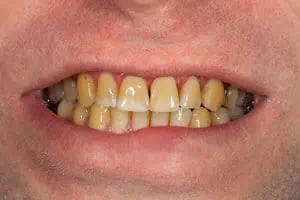

This causes teeth to become discolored, but the discoloring is not uniform because of the process of inhalation. Only the edges and gum lines show significant stains.
Nicotine also causes a reduction in the flow of saliva which promotes dry mouth symptoms. What this means is that in people who smoke, the saliva is not thick enough to offer the same degree of protection to teeth as in non-smokers. This is the main reason why smokers have a higher probability of tooth decay and tooth loss compared to non-smokers. Smoking tobacco products also has an adverse effect on your gums; smokers are twice as susceptible to gum disease.
Have a look at the following video where a doctor explains the negative effects of smoking on teeth:
Usually, people are aware of the health hazards of smoking in terms of diseases like lung cancer, throat cancer, and other respiratory problems. But often, they are considerably less informed about the damage this habit can have on their oral health.
If you smoke, you should regularly consult a dentist. Additionally, you should maintain good oral hygiene and use the best toothpaste for smokers available on the market. Consider using teeth whitening toothpastes specially designed for smokers, like from the popular brand Plus White.
Can a dentist tell if you smoke?
Absolutely! People are often ashamed of their smoking habits and many lie to their dentists about it. However, there are some signs that might still give it away if you smoke.
- Brown stains on teeth
- Unhealthy gums
- Smell of smoke and tobacco
The bottom line is, it’s best not to lie to any medical professional about any habits that may negatively impact your health.
Smoking after tooth extraction
One of the main rules after a tooth extraction is that you aren’t supposed to smoke during the next 72 hours.
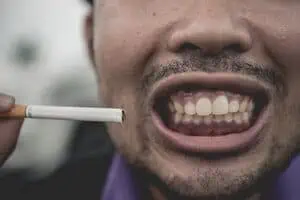

This is for a couple of reasons. For one, the tooth extraction process involves stitching up the extraction point, and smoking within 72 hours poses a risk of breaking those stitches. Additionally, the chemicals in cigarettes slow the healing process.
And then there’s the dreaded dry socket. Dry socket happens when the blood clots that naturally form around the site of tooth extraction are dislodged, exposing the bone at the base of the now-empty socket. The sucking action of smoking can cause this to happen, and result in excruciating pain and another trip to the dentist.
All this is to say, smokers are advised to take a 72-hour respite from smoking, after wisdom teeth removal or extraction of any other of your teeth, to speed-up the healing process.
Another thing to keep in mind is that smoking can cause more frequent oral health problems that may require more frequent tooth extractions. If you’d like to learn more about the risks, have a look at this comprehensive study that analyzes an extraction case in relation to smoking tobacco products.
How to remove smoking stains from teeth
The damaging effects of smoking are far-reaching and wreak havoc on your smile. If you are a regular smoker, you probably know exactly what I am talking about. But, it is never too late to make a change. A cosmetic dentist can repair the damage, so that even a lifelong smoker can have a beautiful, healthy smile.
Teeth whitening can greatly improve the appearance of stained teeth. However, if you are a long-time smoker, porcelain or composite veneers can make your smile as white as you want it. Also, dental implants can replace teeth lost due to smoking. Whatever your smile and health goals are, a dentist can help.
Dr. Shane S. Porter, Premier Dentistry of Eagle
Tobacco smoking stains are often difficult to remove as these develop over years of smoking. Teeth enamel pores are filled with nicotine particles during years of active smoking and removing them completely is usually challenging.
That being said, with the right methods you may be able to whiten your teeth, either through professional help or home remedies, so you can get your confident smile back.
Professional teeth whitening
If you are looking for a quick fix, you may want to opt for one of the following professional whitening solutions.
Professional Clinic Whitening
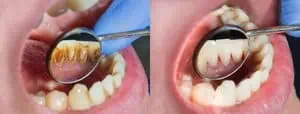

Mostly done by professionals under the supervision of a dentist, in-clinic whitening is a popular choice among many for whitening teeth stained from smoking. Before teeth whitening can be done, a patient’s teeth and gums are thoroughly cleaned, after which a bleaching agent is applied. The procedure may also involve applying UV light or an argon laser at the end.
Dentists often advise avoiding hot and cold food for some time after the procedure since teeth and gums might become hypersensitive. Since the procedure is done under the supervision of dentists, you can consider this a very safe option. Professional options yield good results, but can also be really expensive.
Home whitening products
Teeth whitening strips and gels
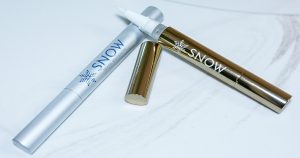

Easily available at general stores or pharmacies, teeth whitening kits like whitening strips, gels and LED kits fall somewhere between professional and DIY solutions. They involve chemical whitening agents and are generally easy to use with detailed instructions.
Some of these gels can also be left on overnight for improved results. But don’t ever keep them on longer than the instructions say. This whitening pen from Snow
Snow is one type of LED whitening kit and is our recommendation for professional-looking results with a lower price tag. You can learn more about this option in our full review of Snow’s teeth whitening kit.
Home Remedies
The beauty of home remedies is that they are easy to follow and don’t require any extensive resources to achieve the desired results. Have a look at the following ideas for home tooth care:
Baking Soda and Hydrogen peroxide
One of the most popular and common DIY methods used by many is applying a combination of baking soda and hydrogen peroxide to your teeth if you have yellow teeth from smoking.
For this method, you just need to create a paste by adding 2-3 drops of hydrogen peroxide to a teaspoon of baking soda. Then apply the paste on your teeth and gently massage for 30 seconds, rinsing your mouth with water when finished.
Note: Some care needs to be taken as scrubbing too hard or using too frequently can wear down your teeth enamel.
Lemon Juice
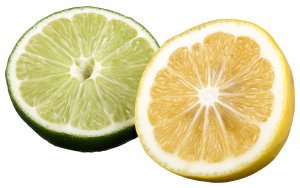

Lemon juice is acidic and can serve as a bleaching agent for your teeth. Regular rinsing of your mouth and teeth with a solution of lukewarm water and lemon juice could remove some tobacco and nicotine stains.
Lukewarm water opens the enamel pores so that lemon juice can slightly penetrate into the smoking stains. It is advised to afterward rinsdre mouth will cold water so that the enamel pores can close back up again. Use lemon juice with caution as it can also erode your enamel.
Turmeric powder
The medicinal benefits of turmeric are well-known, but did you also know that turmeric can be used for teeth whitening? Brushing your teeth daily with a paste made from turmeric and water can also help improve staining from smoking.
Strawberries
Strawberries are rich in an enzyme called malic acid (also commonly used in toothpaste). To make DIY strawberry teeth whitening paste, simply mash up a few strawberries, and add a little water to make a paste, and then apply that to your teeth.
Have a look at the table below for a summary of the cost of teeth whitening for smokers:
Treatment type | Treatment name | Average cost |
Professional teeth whitening | In-clinic procedures | $300–$1,000 |
At-home kits | LED, teeth whitening strips and gels | $15 – $400 |
Natural remedies | Baking soda and Hydrogen peroxide; Lemon juice/Turmeric powder/strawberries | Check your pantry! |
Should you avoid professional teeth whitening? Not really, unless…
It’s always advisable to talk to your dentist about risks before opting for a professional tooth whitening procedure. It may not be the best option for you if you:
- Have sensitive gums and a receding gum line.
- Have undergone dental treatments previously.
- Have sensitive teeth.
- Are worried about cost, since professional procedures are quite costly.
Conclusion
Oral health and hygiene are important factors to consider for smokers. Smokers need to take special care when it comes to tobacco smoking stains if they intend to keep their teeth white. One of the easiest ways to do this is by introducing DIY techniques into your daily routine. If home remedies don’t work, you can always opt for professional teeth whitening services.
Vaping, or smoking e-cigarettes is becoming a popular activity, oftentimes as a transition for people who would like to quit smoking. And while most medical professionals agree that vaping isn’t as bad for your oral health and overall health as smoking, it’s still detrimental.
FAQs
How do I get rid of smokers’ teeth?
To get rid of smokers’ teeth, you can go in for professional whitening at the dentist, purchase an at-home kit, or you can try natural remedies. Talk to your dentist about what might work best.
How does nicotine affect your teeth?
Nicotine has adverse effects on oral health. Apart from being highly addictive, it gets deep into the pores of teeth enamel and can result in periodontal disease. Nicotine also reduces saliva flow in the mouth. As a result, smokers’ mouths don’t have sufficient saliva to naturally protect teeth.
How does smoking affect your mouth?
Smoking tobacco products can lead to major oral health issues such as tooth decay and tooth loss, periodontal disease, oral cancer, bad breath, teeth stains, and complications after oral surgery.
Mouthhealthy.org: Smoking and Tobacco. Consulted 18th March 2024.
Ncbi.nlm.nih.gov: The effect of cigarette smoking on the severity of pain, swelling and trismus after the surgical extraction of impacted mandibular third molar. Consulted 18th March 2024.
Verywellhealth.com: How Professional Teeth Whitening Is Done. Consulted 19th March 2024.
Nidcr.nih.gov: Dry Mouth. Consulted 20th March 2024.
Researchgate.net: Extrinsic stains and management: A new insight. Consulted 17th April 2024.
Sunstar: Global Healthy Thinking Report. Consulted 11th September 2024.




